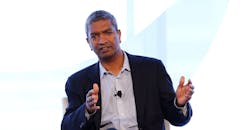The CEO of a Fuel Cell Company Doesn't Believe in Fuel Cell Cars
Fuel cells have no more passionate an advocate than Bloom Energy Corp. Chief Executive Officer K.R. Sridhar, whose company makes power generators with them and tirelessly touts their ability to produce clean energy.
He just doesn’t like them in cars.
“It’s not the right use for them,” he said Wednesday in an interview in San Francisco. “I’m not a believer in it.”
In perhaps the latest sign of the electric car boom overtaking hydrogen, Sridhar said fuel cells make more sense powering the stations that charge EVs as opposed to powering cars themselves. “I believe fuel cells will still play a very important role with cars, but they will be the gas station,” he said.
Chemical Plant
While carmakers including Toyota Motor Corp. and Honda Motor Co. have for years tried to get fuel-cell cars to take off -- marketing them as a longer-range alternative to EVs and faster to refuel -- Sridhar said they have serious drawbacks.
“By having a fuel cell in your car, you are de facto carrying a chemical plant with you wherever you go, and you’re carrying all the fuel necessary for it,” he said. Cars, he added, are already too heavy and inefficient, and “now you want to add a bulky chemical plant with its fuel tank?”
Bloom makes stationary fuel cells that supply buildings with electricity, counting Apple Inc., Intel Corp. and Walmart Inc. among its customers. Like all fuel cells, Bloom’s units generate power through an electro-chemical process, with no greenhouse gases released.
By David R. Baker
About the Author
Bloomberg
Licensed content from Bloomberg, copyright 2016.
